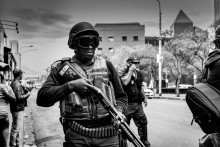‘I began my research based on a question from practice,’ says Oostinga. ‘A crisis negotiator approached us. He was attempting to persuade someone not to jump off a building. Everything was going well, but then the negotiator made a joke and the joke wasn’t received as he expected. The situation got very tense and the negotiator wasn’t sure what to say next. Luckily, everything ended well, nobody was hurt, but he wondered: what does research tell us about these situations?’
Oostinga soon found out that research didn’t say anything at all on the topic, and so she started her own. Today, she will present her findings during the defense of her PhD thesis titled ‘Breaking (the) ice: Communication error management in law enforcement interactions’. She hopes that her work can provide police interviewers and negotiators with useful guidance on how (not) to talk to suspects, specifically after they say ‘something wrong’.
‘Errors also have one surprising effect’
‘Police interviewers and negotiators make various communication errors,’ explains the soon-to-be UT graduate. ‘They make factual mistakes, such as calling the suspect by the wrong name. Or they can make judgement errors, for example using a very formal approach, while the suspect would prefer an informal one.’
Based on studies involving students and professional police officers, Oostinga found that making an error, however, doesn’t have to be catastrophic. ‘Yes, we concluded that errors can have a negative effect on the interaction. For example, they can result in distrust from the side of the suspect. But, errors also seem to have one surprising effect. They can incline the suspect to talk more. That raises the question whether we could use errors as an interviewing technique in the future.’
'Could use errors as an interviewing technique in the future?’
‘It all depends on how you react after you make the error,’ stresses the researcher. ‘Because we observed that after the officers make the mistake, their stress level increases and they partly lose focus on the interaction. But – as is the main message of my thesis – if you make an error and respond appropriately, you can actually “break the ice” between you and the suspect.’
Funded by a U.S. intelligence agency
It’s plausible Oostinga’s findings will be used in practice – and not only in the Netherlands. She has already presented her work to Dutch police officers and to the High-Value Detainee Interrogation Group (HIG), a U.S. intelligence-gathering organization that brings together professionals from the FBI, CIA and the Department of Defense.
‘The HIG actually funded my research, because the agency aims to study the effectiveness of interviewing methods. They want to find out which methods work, but are ethical at the same time,’ clarifies Oostinga, who currently works for the Dutch Ministry of Justice and Security. ‘My dream would be to continue my research and make my findings applicable for the training of law enforcement officers. Because I believe that we, as researchers, should start building the bridge between policy, science and practice.’






